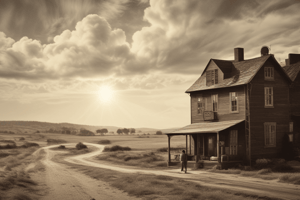Podcast
Questions and Answers
What was The New Deal?
What was The New Deal?
- A series of domestic programs enacted in the United States (correct)
- A budget proposal
- A foreign policy strategy
- A military initiative
What did FDR declare the day after his inauguration?
What did FDR declare the day after his inauguration?
National Bank Holiday
FDR suspended the gold standard to avoid inflation.
FDR suspended the gold standard to avoid inflation.
False (B)
What did the Glass-Steagall Act impose regulations on?
What did the Glass-Steagall Act impose regulations on?
What benefits did the Social Security Act provide?
What benefits did the Social Security Act provide?
What rights did the National Labor Relations Act give to organized labor?
What rights did the National Labor Relations Act give to organized labor?
What were the First 100 Days?
What were the First 100 Days?
What was the purpose of the Civilian Conservation Corps established in 1933?
What was the purpose of the Civilian Conservation Corps established in 1933?
What economic event did FDR face during his presidency?
What economic event did FDR face during his presidency?
What did FDR pledge in his inaugural speech in 1933?
What did FDR pledge in his inaugural speech in 1933?
What was the National Bank Holiday declared by FDR?
What was the National Bank Holiday declared by FDR?
Flashcards are hidden until you start studying
Study Notes
The New Deal
- A series of domestic programs implemented in the U.S. from 1933 to 1938, aimed at economic recovery.
National Bank Holiday
- Declared by FDR immediately after his inauguration to temporarily close all banks, safeguarding the financial system from collapse.
- Aimed to rebuild public confidence; banks reopened after one week without panic.
Ending The Gold Standard
- FDR suspended the gold standard to combat deflation.
- U.S. dollars were no longer required to be backed by gold reserves, facilitating more flexible monetary policy.
Glass-Steagall Act
- Introduced regulations that separated commercial banking from investment banking.
- Prevented banks from engaging in financial speculation with depositors' money; remained in effect until its repeal in 1999.
Social Security
- Established under the Social Security Act to provide financial benefits for the elderly and unemployed, ensuring a safety net for vulnerable populations.
National Labor Relations Act
- Empowered organized labor by granting rights to collective bargaining and requiring employers to permit unionization among employees.
The First 100 Days
- A crucial period in which FDR introduced numerous legislative measures and sought extensive powers from Congress, comparable to those given during wartime.
Civilian Conservation Corps (1933)
- Provided employment to young men aged 17 to 24, structured similarly to military organizations, focusing on environmental conservation projects.
The Depression
- FDR's presidency coincided with the aftermath of the 1929 Wall Street Crash, during which the U.S. faced severe economic hardship and widespread poverty.
FDR's Inaugural Speech (1933)
- Emphasized a commitment to transforming America, advocating for increased federal assistance to support citizens in need.
The National Bank Holiday (Repeated entry)
- Noted again for its significance in FDR's immediate response after taking office, aimed at stabilizing the banking sector and restoring trust among the public.
Studying That Suits You
Use AI to generate personalized quizzes and flashcards to suit your learning preferences.




